I'm excited to share affordable nail art techniques that let you express your creativity without breaking the bank. Start with basic tools like dotting tools and old toothbrushes for unique designs. Painter's tape can create sharp lines, while household items can add a personal touch. I love experimenting with budget-friendly paints and sponges for gradient effects. Taking the time to prep your nails is essential for long-lasting results, too. With a little patience and practice, you can create stunning nail art that reflects your style. Stick around, and you'll discover even more tips and tricks for your nail art journey!
Key Takeaways
- Explore simple techniques like dotting and striping using inexpensive tools like toothpicks and cotton swabs for creative designs.
- Use painter's tape to create clean lines between colors, allowing for bold and intricate patterns without high costs.
- Experiment with household items, such as old toothbrushes for splattering, to achieve unique nail art effects on a budget.
- Invest in affordable nail supplies from local craft stores, ensuring you have the essentials to create stunning designs.
- Prioritize thorough nail prep and a good base coat for long-lasting results, enhancing the overall appearance of your affordable nail art.
Essential Tools for Nail Art
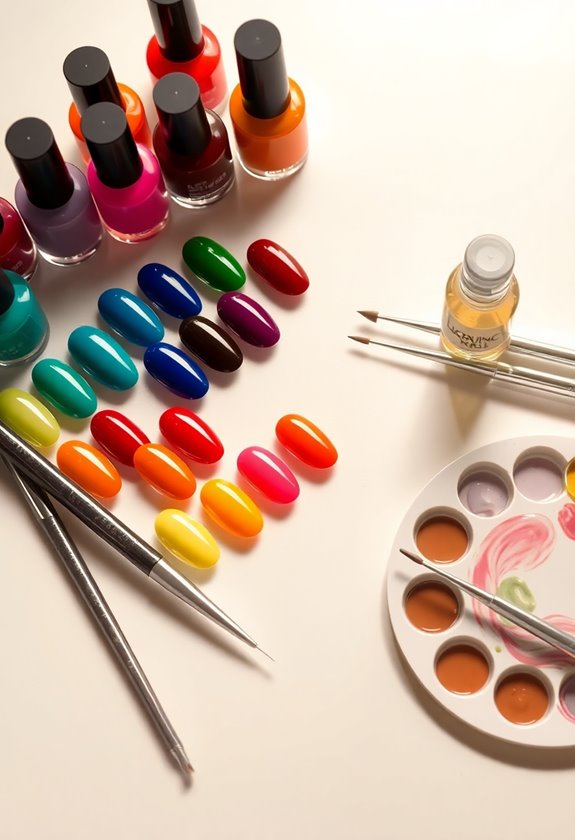
When diving into the world of nail art, having the right tools is like a painter needing their brushes. I've found that investing in quality nail art brushes makes a huge difference in the precision of my designs. Whether it's for fine lines or detailed patterns, having a variety of brush sizes at my disposal helps me release my creativity. Nail art stencils are another essential tool I can't live without. They allow me to achieve intricate designs with ease, especially when I'm short on time or feeling less confident in my freehand skills. Combining these tools not only enhances my nail art but also makes the process enjoyable. So, gather your brushes and stencils, and let your imagination run wild!
Simple Techniques for Beginners
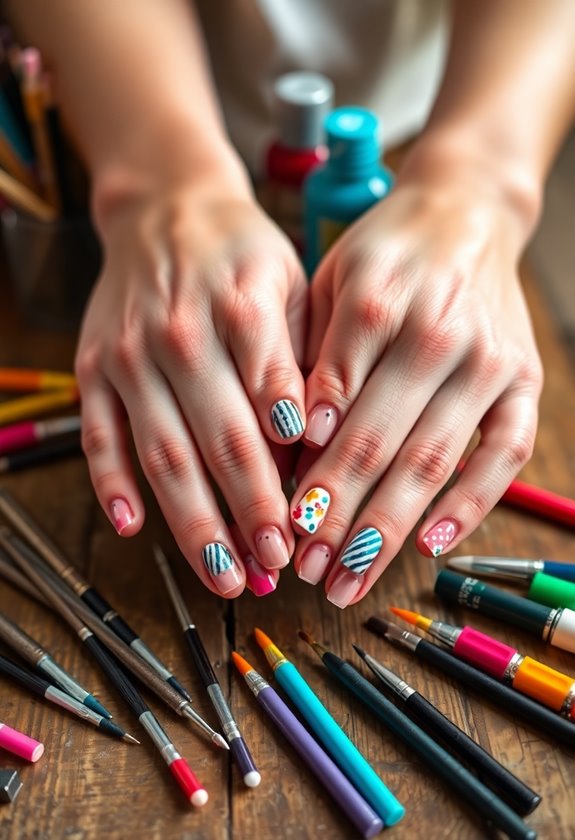
Having the right tools sets the stage for creating stunning nail art, but knowing some simple techniques can really elevate your skills, especially if you're just starting out. First, practice the nail art basics like dotting, striping, and gradient techniques. These are essential for building your confidence. I recommend starting with a simple dotting tool to create fun patterns and designs. Also, don't rush! One of the most common beginner mistakes is applying too many layers too quickly, which can lead to smudging or uneven textures. Instead, let each layer dry before adding more. Finally, experiment with colors and designs that inspire you, as this will keep your nail art journey enjoyable and creative!
Creative Designs With Household Items
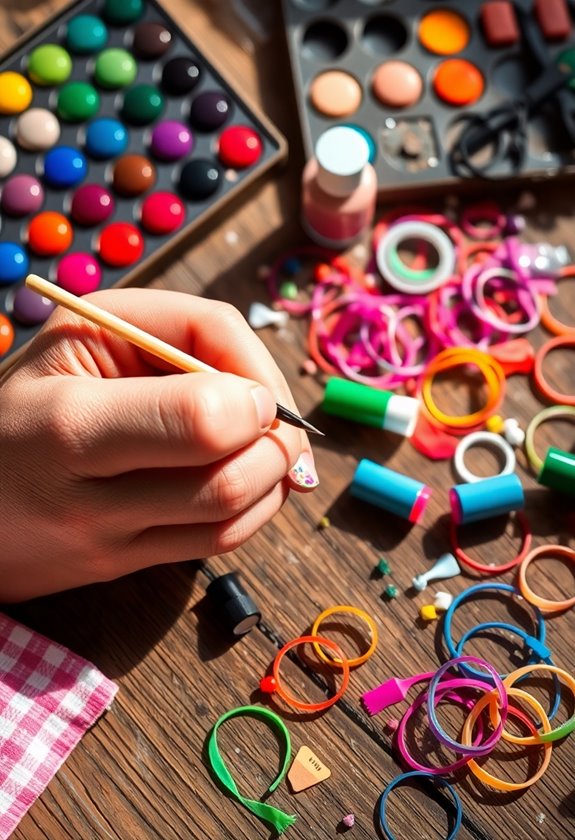
Release your creativity by using everyday household items to create unique nail art designs. I love experimenting with things around the house for fun, creative patterns that stand out. For instance, I often use a cotton swab to make dots or a bobby pin to create swirls. You can even use painter's tape to get those crisp lines between colors. Got an old toothbrush? It's perfect for splattering paint for a fun, abstract look! I've also used the bottom of a bottle to stamp out shapes. The best part? These techniques are not just budget-friendly but also allow you to personalize your nail art. So, gather those household items and let your imagination run wild!
Affordable Nail Art Supplies
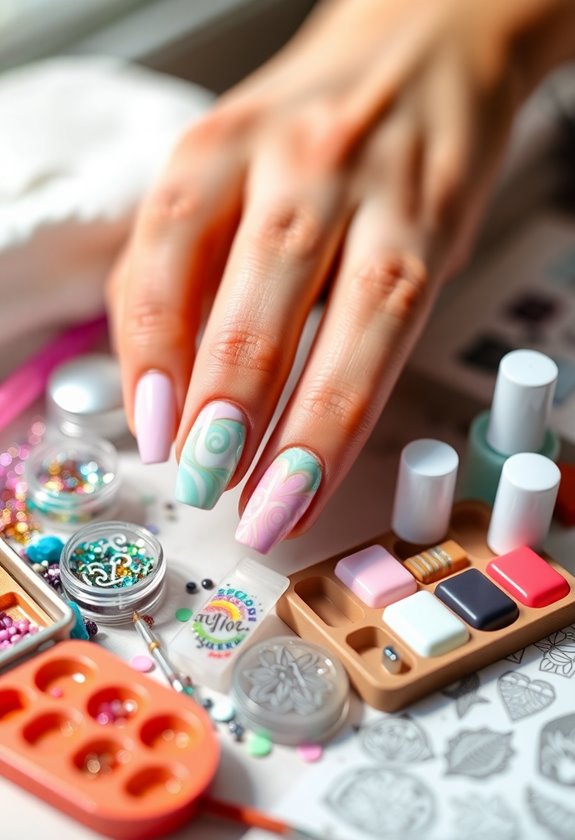
Nail art doesn't have to break the bank! I've discovered that you can create stunning designs using budget-friendly paints available at local craft stores or online. These paints come in a variety of colors and finishes, making it easy to find something that suits your style without spending too much.
When it comes to tools, I've found that DIY nail tools can be just as effective as pricey alternatives. For instance, a simple toothpick works wonders for intricate details, while a makeup sponge can help achieve that gradient effect we all love. Investing in a few essential supplies allows me to release my creativity without feeling guilty about the cost. So let's get started on creating beautiful nail art without the hefty price tag!
Tips for Long-Lasting Results
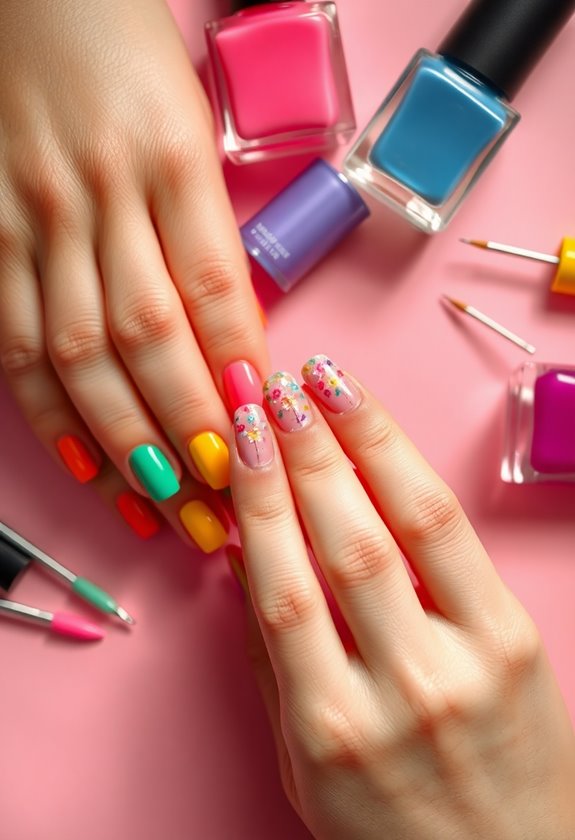
To achieve long-lasting results with your nail art, preparation is key. I always start with thorough nail prep; this means cleaning, buffing, and ensuring my nails are free from oils or residue. I find that using a good base coat not only enhances color but also helps the polish adhere better. After applying my designs, I never skip the top coat. It seals everything in place, adds shine, and protects against chips. I also make sure to allow each layer to dry completely before adding the next. If I'm using glitter or intricate designs, I'll even apply two layers of top coat for extra durability. These simple steps really make a difference in how long my nail art lasts!
Frequently Asked Questions
Can I Use Regular Polish for Nail Art Instead of Gel?
I get it—some think gel's the only option, but I've created amazing designs using regular polish. There's a variety of nail polish types that work well; my favorite art supplies are versatile and budget-friendly!
How Do I Remove Nail Art Without Damaging My Nails?
I've found that gentle removal techniques work best for my nails. I soak them in acetone-free remover, wrap each finger in foil, and let it sit. This way, my nail care stays intact without damage.
Are There Specific Nail Shapes That Work Better for Art?
I've found that certain nail shape styles really enhance nail art. Art-friendly shapes like almond or stiletto provide more surface area, allowing me to get creative with designs. They truly elevate my nail art experience!
Can Nail Art Be Done on Acrylic or Gel Nails?
Absolutely, I've done nail art on both acrylic and gel nails! With the right nail art tools and design techniques, the process becomes even more fun and creative. You'll love experimenting with different styles!
What Are the Best Ways to Fix Mistakes in Nail Art?
Creating nail art feels like painting a masterpiece, but even artists stumble. For nail art corrections, I suggest using a fine brush to fix common nail mistakes or adding glitter to disguise imperfections creatively.
